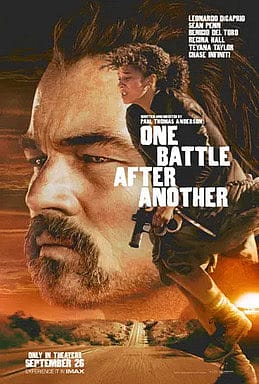Where Fascism Loses the War

Thomas Pynchon has influenced many writers and filmmakers, but none more than director Paul Thomas Anderson. He had earlier adapted the reclusive American author’s 2009 novel into an eponymous movie, Inherent Vice, in 2014.
This time around, Anderson has made One Battle After Another, recently released globally and starring Leonardo DiCaprio, Sean Penn, Benicio del Toro and others. The film is inspired by — and loosely based on — a Pynchon novel from 1990, titled Vineland, which is set in 1984, the year of Ronald Reagan’s election. The novel was considered by some as ‘Pynchon Lite’, while being lapped up by, among others, Salman Rushdie – it was his first review after the infamous fatwa and many critics suggested it was the first sign of life from Rushdie who had gone silent following all the life-changing developments after his book Satanic Verses was published in 1988.
Now, it is not just iconic figures from the movie who showcase a stunning performance. While DiCaprio, the paranoid washed-out revolutionary, is fun to watch, especially when he sets out to rescue his daughter, fighting off his demons by the power of paternal love, Penn, whose gait, composure and attire appear gender-fluid, is meant to be sinister in this movie. He does justice to the role of an unscrupulous military officer, bringing to mind ICE officers in the Trump era. In sharp contrast to both, one flustered and the other diabolical, del Toro is unruffled and as cool as a cucumber even in the face of near-death experiences. A martial-arts instructor and leader of illegal aliens in a fictional town in California, he is the coolest dude in the movie who talks about the normality of being under siege for generations.
AIming High
20 Feb 2026 - Vol 04 | Issue 59
India joins the Artificial Intelligence revolution with gusto
The movie starts with members of the ultra-left group French 75 launching attacks on prisons housing illegal immigrants to free them, and setting off bombs in the offices and homes of high-level state officials. The natural leader of the pack is Teyana Taylor, who plays the role of strangely titled Perfidia Beverly Hills, who is assisted by Pat (DiCaprio who later acquires a new identity, Bob Ferguson), Deandra (Regina Hall), and others like Howard Sommerville (Paul Grimstad who is also known in the movie as Billy Goat) and Junglepussy (yes, that is the name of the character of Shayna McHayle). In Pynchon’s novel, the name for the group is 24fps.
After initial successes, the group suffers a setback following a bank robbery in which Hills is caught by Steven J. Lockjaw (Sean Penn), whom we see earlier in the movie as a prison guard outwitted by Hill, then as an officer who accepts sexual favours from Hill to free her after a bomb attack. Lockjaw offers Hill witness protection for details about the rest of French 75 and goes after some of them, eliminating them. Shortly thereafter, Hill flees from Lockjaw’s custody. By then, French 75 members have to go underground because their identities are with the authorities, but not the details of their new hideouts. That is the reason Pat becomes Bob and daughter (from Hill) Charlene becomes Willa (played by Chase Infinit), both hiding from justice.
Everything goes well until 16 years later, when Sommerville, the comrade who secured hiding places for the surviving French 75, gets caught and emotionally blackmailed using his sister, into revealing information about those forced into hiding. At the same time, French 75 members also get the message to run, especially because Lockjaw wants to get rid of Willa as he had by then become a member of a white supremacy group, which cannot stand anyone who has had an interracial relationship. Lockjaw wants to get rid of any evidence of his link with Hill (assuming Willa could be his daughter).
What happens next is a struggle to kill and not to get killed. The film brings to the fore the extent to which secret societies go to preserve the status quo, often doing things that make them more powerful. Anyone who hurts their interests knowingly or unknowingly is fair game. The film acquires a greater meaning in the wake of news of ICE officers taking people with visa irregularities into custody with force and without warning. The depiction of similar arbitrary tactics places 55-year-old Anderson’s film in a sociopolitical context too difficult to ignore, especially in a country created by immigrants who dispossessed indigenous people. Statements from white supremacists in the movie, who tend to look down on anyone who is not white, and especially those blood lines more indigenous to the Americas, mirrors the statements normalised by today’s supremacists who thrive on selling hate and generating outrage.
To me personally, two breathtaking scenes that capture Anderson’s genius are of a drugged-out DiCaprio watching Gillo Pontecorvo’s 1966 movie Battle of Algiers in his hideout and that of Penn getting gassed to death by the white supremacists – as though it is some kind of euthanasia. One is about hope of freedom and liberation that could happen out of the blue and the other, death in a flash.
Above everything else, it is her debut film in which Chase Infinity, 25, delivers a standout performance.
